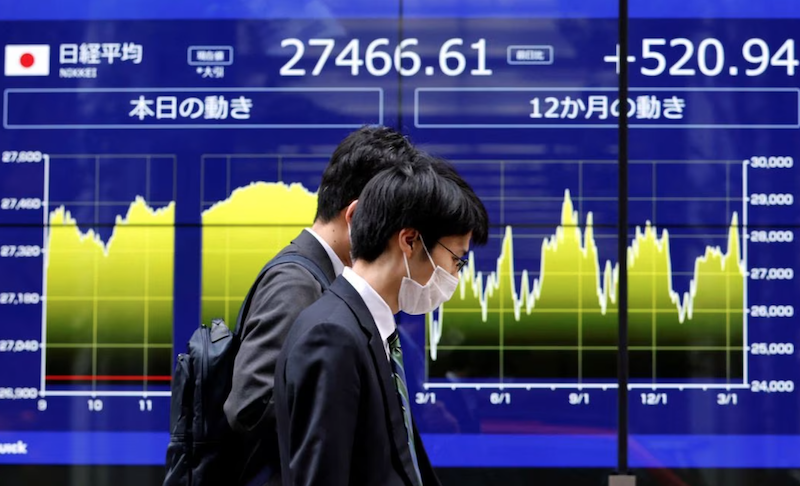Asian shares rallied on Friday led by a surging Nikkei index which hit a 33-year-high off the back of strong domestic earnings and optimism over a US debt ceiling deal.
An economy that is also showing signs of a revival and a renewed interest from foreign investors in the wake of increased investment by Warrant Buffett has recently boosted Japan’s benchmark, with the index soaring 18% in the year, far outperforming other major Asian markets.
Spoiling the party mood at the end of the week were stocks in mainland China and Hong Kong where tumbling tech shares dragged the indexes down.
Also on AF: China Risks ‘Wasting Tonne of Money’ on State-Led Growth
Tokyo’s benchmark Nikkei index jumped as high as 30,924.57 before closing the day up 0.77% at 30,808.35, a seventh straight winning session.
The broader Topix, which had reached the post-bubble milestone on Tuesday, extended its climb to as high as 2,171.37, before ending with a more modest 0.18% gain to 2,161.69.
Japan’s stock rally has also been fuelled by a weaker yen underpinned by views that the Bank of Japan will keep stimulus for longer and an economy that is starting to show signs of a post-Covid-19 consumption revival.
Despite that optimism, the market is flashing some warning signs. Chip stocks started the day strongly following a rally for US peers but then erased those gains or even turned sharply lower.
“Investors are going to spend today thinking hard about whether this Nikkei rally will continue,” said Kazuo Kamitami, a strategist at Nomura Securities.
“The word ‘overheated’ is going to be very much front of mind.”
Meanwhile, China stocks retreated, pulled down by semiconductor and consumer-related shares, as a streak of poor macro data weighed on investor sentiment. Hong Kong stocks declined, led by tech shares after e-commerce giant Alibaba posted weaker-than-expected earnings.
The Shanghai Composite Index fell 0.42%, or 13.78 points, to 3,283.54, while the Shenzhen Composite Index on China’s second exchange edged up 0.12%, or 2.42 points, to 2,031.10.
In Hong Kong, tech giants led the declines, shedding 1.8% after Alibaba Group Holding Ltd posted a 2% rise in quarterly revenue that missed expectations. The e-commerce giant also said it would list its cloud computing business next year.
Hong Kong’s benchmark Hang Seng Index was down 1.40%, or 276.68 points, to 19,450.57, while the China Enterprises Index fell 1.81%.
Elsewhere across the region, Sydney, Seoul, Singapore, Mumbai, Taipei, Manila, Wellington and Jakarta were up.
MSCI’s broadest index of Asia-Pacific shares outside Japan was up 0.20% and was set to clock a gain of 0.60% for the week, its best run in over a month.
Offshore Yuan Remains Weak
Investor attention has been firmly on the negotiations over US debt ceiling and rising optimism that a deal could be reached soon sent US shares higher overnight.
E-mini futures for the S&P 500 rose 0.17% in Asian hours. And futures indicated European stocks were set to open higher, with Eurostoxx 50 futures up 0.44%, German DAX futures up 0.41% and FTSE futures up 0.23%.
Meanwhile, data overnight showed fewer-than-expected Americans filed initial jobless claims last week, lowering odds the Federal Reserve will cut interest rates before year-end.
The Fed has lifted borrowing costs at each meeting since March 2022, bringing them from near zero to a 5.00-5.25% range as of early this month.
Markets are now pricing in a 36% chance of a 25 basis point hike when the Fed meets next month, compared with 10% chance a week earlier, the CME FedWatch tool showed.
In the currency market, the yen strengthened 0.24% to 138.40 per dollar but was hovering near the six-month low of 138.75 touched overnight. Against a basket of currencies, the dollar rose 0.029% and was wedged near a two-month high.
The offshore yuan fell to 7.0677 per dollar, its weakest since December 2. Analysts predict more weakness in the future and point to the Fed’s policy as being the bigger driver than economic weakness at home.
US crude rose 0.65% to $72.33 per barrel and Brent was at $76.43, up 0.75% on the day.
Key figures
Tokyo – Nikkei 225 > UP 0.77% at 30,808.35 (close)
Hong Kong – Hang Seng Index < DOWN 1.40% at 19,450.57 (close)
Shanghai – Composite < DOWN 0.42% at 3,283.54 (close)
London – FTSE 100 > UP 0.38% at 7,771.75 (0938 GMT)
New York – Dow > UP 0.34% at 33,535.91 (Thursday close)
- Reuters with additional editing by Sean O’Meara
Read more:
China’s Alibaba Approves Spinoff of Cloud Computing Business
China’s Debt-Laden Property Sector Still Facing Weak Demand
Weak Yuan Dents Asia Currencies, Indian Rupee at Six-Week Low























